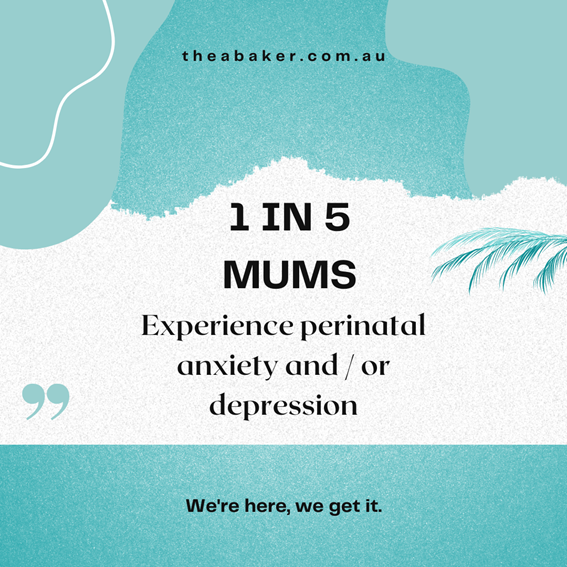Perinatal mental health
Perinatal mental health
For once I’m on top of the timing of events, and I happen to be writing this week’s blog to coincide with perinatal mental health week (6th – 12th November 2022). It’s going to be all about understanding what perinatal mental health is, how to get support, how to support others around you and where to go for help if you or someone you love needs it.
Perinatal mental health refers to the emotional wellbeing of a woman, her partner and infant from conception (yep, that early) until 24 months postpartum (yep, that long). It represents a transitional life stage that can be associated with increased vulnerability to experiencing poorer than (your) usual mental health. Any life stage transition can be tricky to navigate (how fun was puberty, right?!) but pregnancy and parenthood can be especially challenging. According to COPE (Centre of Perinatal Excellence), “The experience of pregnancy and parenthood differs for each woman and is influenced by the stability of her relationships and social network. While the biggest risk factor for developing perinatal mental health conditions is a previous mental health history, the presence of psychosocial risk factors may be associated with greater risk of onset, relapse, or exacerbation of mental health conditions. Women who feel isolated either by distance, culture, or both, are more likely to develop distress or mental health conditions in the perinatal period (Austin et al 2015). The likelihood is also greater for women who have experienced life stressors (e.g., family problems, family violence or loss, disability) or multiple traumas (Austin et al 2015).”
Looking after your perinatal mental health:
- Don’t put too much pressure on yourself – there’s no perfect way to navigate this transition, try to find time for your own relaxation and de-stressing strategies.
- Be mindful of the pressures from others – this one is extra tricky because in addition to the expectations we have, there are all the expectations of others around us (parents, in-laws, friends, family, colleagues). They all might have advice, suggestions and opinions to give – you might have to be quite firm with your boundaries.
- Identify other supports – there’s a list below of providers who have amazing resources in this space, but remember there’s your healthcare team, child and maternal health team and it might be time to add a mental health support team in the mix too.
- You can exert some choice – if you’re not happy with your team, it’s ok to voice your concerns and explore other options. If you don’t feel like you’re being heard or aren’t having your concerns / questions adequately resolved don’t feel that you don’t have a choice. During pregnancy and early parenthood, it’s vital to have the right mix of supports around you – safe support is key!
- Read the signs and remember you know you (and your baby) best – if you’ve struggled with depression and / or anxiety before be especially aware of your triggers. Be mindful of any significant and sustained changes in the way that you’re thinking, feeling and / or behaving. If you’re constantly worrying, experiencing ongoing, unresolved stress or distress ask for help sooner rather than later.
- Lower your standards (and lower them again) – especially in the early days of pregnancy if you’re especially tired or nauseated and early days of bringing baby home. It really doesn’t matter if the house is messy or you’re napping with baby (in fact, this is GREAT!). Recognise that a little bit of chaos comes with the territory and asking for help is not a sign of not coping. You’ll take time to find your feet, but with the right help around you, you’ll find them again soon.
Additional resources:
- Antenatal & Postnatal Psychology Network: https://www.antenatalandpostnatalpsychology.com.au/
- Birth Trauma Association: https://www.birthtrauma.org.au/
- Bears of Hope (baby/infant loss): https://www.bearsofhope.org.au/
- Birthing Dads: https://www.birthingdads.com.au/
- Centre for Perinatal Psychology: https://www.centreforperinatalpsychology.com.au/
- COPE: https://www.cope.org.au/
- DadSpace: https://www.dadspace.com.au/
- Gidget Foundation Australia: https://gidgetfoundation.org.au/
- Jean Hailes (women’s health): https://www.jeanhailes.org.au/
- Motherland (rural mothers support): https://motherlandaustralia.com.au/
- MumSpace: https://www.mumspace.com.au/
- PANDA: https://panda.org.au/
- Red Nose: https://rednose.org.au/
- Stillbirth Foundation Australia: https://stillbirthfoundation.org.au/
- The Pink Elephants Support Network (miscarriage and early pregnancy loss): https://www.pinkelephants.org.au/
If you need support around perinatal mental health or birth trauma, we have a team of therapists at Thea Baker Wellbeing – please reach out to us at: hello@theabaker.com.au / 03 9077 8194.


